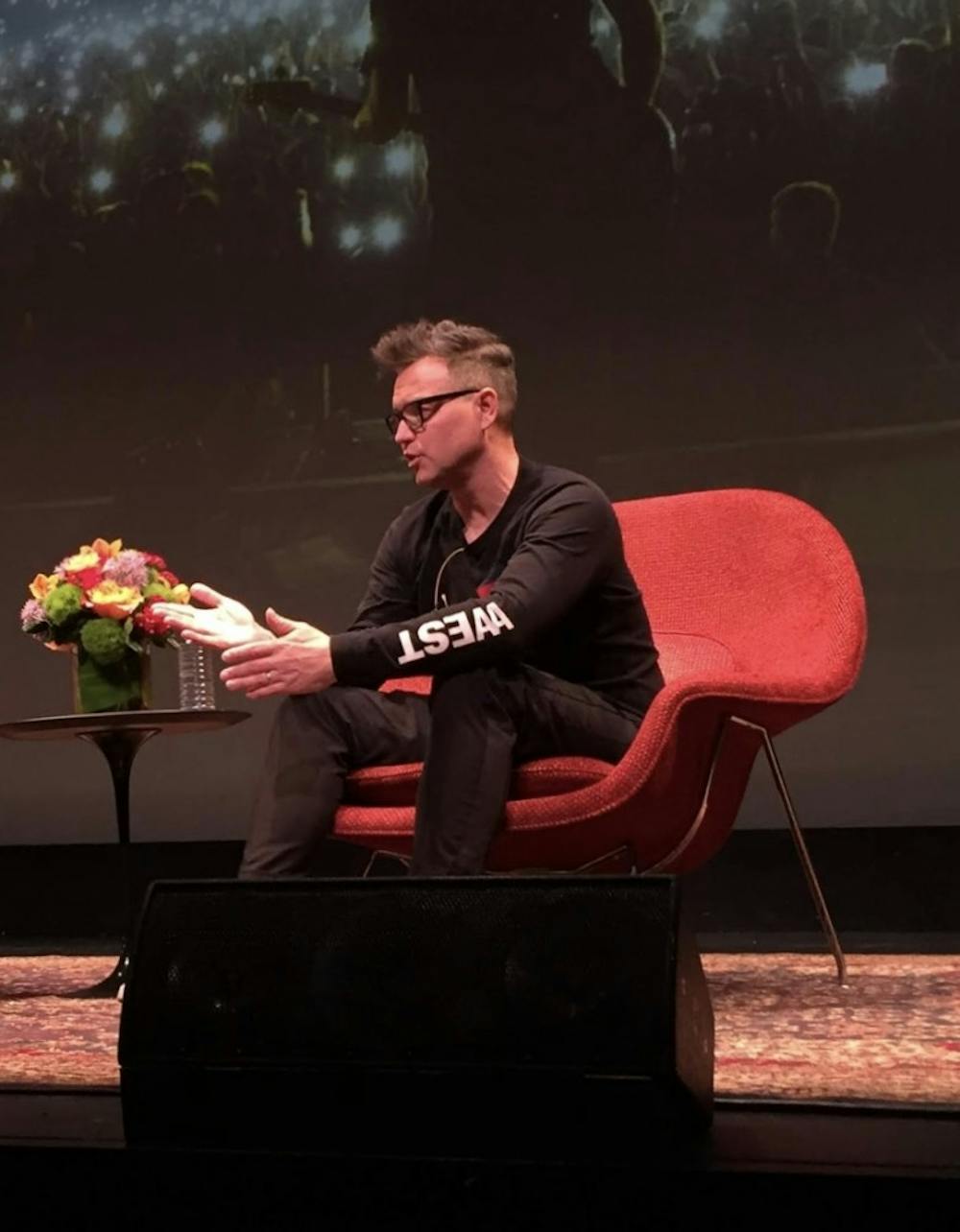As the co-lead vocalist and bassist for Blink-182, Mark Hoppus has played an integral role in shaping the pop punk music genre with hit songs like “All the Small Things” and “What’s My Age Again?” Nearly three decades since its founding in 1992, Blink-182 has released seven studio albums, selling over 50 million records worldwide.
With a new Blink-182 album coming out this summer in addition to releasing an EP on March 29 for his new duo with Alex Gaskarth of All Time Low called Simple Creatures, Hoppus sat down with The Daily Princetonian after giving a talk at Berlind Theatre on Monday night to discuss his career, musical inspirations, and rapid-fire impressions of his own work.
The Daily Princetonian (DP): What are you listening to right now?
Mark Hoppus (MH): I’ve just discovered this band called Bones. They’re from the UK and they sound like — there’s two women in the band, and it sounds like if women took over Nine Inch Nails. It’s like rock music and leather jackets and dirty beats and shreddy guitar. It’s really cool.
DP: Given that you grew up in California and Virginia surrounded by skateboarding and punk rock, what role did music play in your life growing up?
MH: I don’t think that I really felt like myself until I started listening to music that I felt defined me. When I heard the Descendents, when I heard The Cure, when I heard Bad Religion, it was music that spoke to me and that I could relate to, and I didn’t really feel like myself until I heard music that felt like it was speaking to me. The first time that I heard “Silly Girl” by the Descendents, it changed my whole life. All the punk rock that I had heard before that was very political, very angry, very angsty, negative, kind of screamy, and then here was the Descendents, that sounded like punk rock Beach Boys and they were singing about girls and food and parents and school, weekends, and I was like, ‘Oh, my people.’
DP: Since its forming in 1992, Blink-182 has been a big influencer on the development of the pop punk genre. What was the inspiration for your original sound? How have you maintained that foundation over the years, and in what ways do you think Blink-182 has changed over time?
MH: I think that we’ve always stuck true to our core, which is catchy songs, good hooks, great melodies. When we first started, all we wanted to do was play fast and loud, and I think that as we grew up we wanted to write songs that went to different places but still had the same heart. Even a song like “I Miss You” compared to a song like “Dammit,” I think that they both have the same heart to them even though they’re sonically very different.

DP: A lot of Blink-182’s initial popularity in its first decade or so came about through platforms like TRL and MTV. Today, various online streaming services dominate music consumption. What do you think about the change in music accessibility? Has this affected you as an artist?
MH: I love it. I think that the barrier of entry for music now is so low. I mean if you look at the rise of SoundCloud rap, it’s just people on their laptops, people on their iPads — you can make music so easily now that sounds very professional, so it really just comes back down to the great equalizer, which is great music. Great music is going to rise to the top. It’s just harder to break through, but it’s different. Back in the day, there were gatekeepers, there were barriers, there were radio stations, there were music programmers, there were music journalists, A&R people, and they kind of were the gatekeepers. And now that’s all gone. There’s still like, obviously, influencers I guess, people that you look to or whatever. But now the barrier of entry to get a decent sounding recording is very low, and I think it makes for the democratization of music and I like it.
DP: What do you think the legacy of Blink-182 is today?
MH: I think Blink-182 is beginning to establish a legacy. We really don’t want to be thought of as a legacy band at this point, we want to keep on creating new music and new music and new music, and not be one of those bands that’s just like, ‘Oh, we’re going to play “Dammit” and “What’s My Age Again?” and “Rock Show” and call it good.’ We want to keep creating new music, but hopefully our legacy when we do finish is that I want people to look back and say, ‘I had a lot of fun listening to that band and they really spoke to me and I loved going to the shows.’

DP: What has been the most challenging part of Blink-182? What has been the most rewarding?
MH: I really don’t think of any challenging parts of Blink-182. The challenging part, I guess the worst is being gone from my family when I tour, but I’m doing exactly what I love and my family is very supportive and we have a very strong foundation as a family, and so when I’m gone we talk all the time. I don’t feel like there are a lot of challenges. But the reward is getting to play music and thinking that a song that I write sitting on a couch in my bedroom or my living room gets sung back to me at a show in Milan, Italy two years later is amazing.
DP: You announced in January that you and Alex Gaskarth of All Time Low have been working together to create a new duo called Simple Creatures, whose EP Strange Love will be released on March 29. What is your vision for Simple Creatures? How would you describe its sound?
MH: Simple Creatures we describe as trash pop, which I think is pretty apt. We have these big bombastic drum loops and samples over distorted synthesizers and ratty sounding guitars, but it is still really catchy. So we call it trash pop. And the whole idea was just to get in the studio, Alex and myself, and do something totally different, something that neither of us really felt comfortable with but really liked. That’s been the goal the whole time.
DP: Let’s say you are stranded on a desert island and can only have three albums to listen to for the rest of your life. What are they?
MH: The Beatles’ “White Album”, Descendents’ “I Don’t Want to Grow Up”, and Amon Tobin’s “Foley Room”.
DP: What is the first thing that comes to mind for the following albums:
“Cheshire Cat” (1995)
MH: The first thing I think about is junior high school photos, because it’s kind of when you look back and there’s things about it that embarrass you and there’s things about it that you love.
DP: “Dude Ranch” (1997)
MH: An auspicious beginning. I thought we were really beginning to find our legs there.
DP: “Enema of the State” (1999)
MH: Breakthrough, all your dreams come true.
DP: “Take Off Your Pants and Jacket” (2001)
MH: Introspective and us trying to re-center ourselves.
DP: “Blink-182/The Untitled Album” (2003)
MH: That’s our confident record. That’s when we really felt like we wanted to do something different and cool.
DP: “Neighborhoods” (2011)
MH: A stumbling reformation.
DP: “California” (2016)
MH: Exuberant, fun, us going back to our roots.
DP: “Strange Love” (2019)
MH: New and exciting.
DP: The new Blink-182 album you are currently working on
MH: This new Blink album is Blink in the future.








